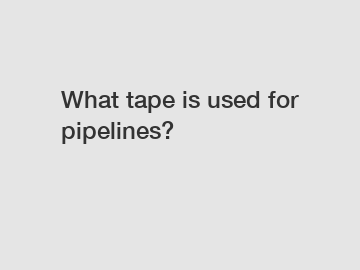What tape is used for pipelines?
What tape is used for pipelines?
Pipelines are crucial infrastructure components used for the transportation of various fluids, such as oil, gas, or water, over long distances. These systems require careful maintenance to ensure their efficiency and safety. One essential aspect of pipeline maintenance is the use of appropriate tape to seal and protect them. In this article, we will explore the different types of tape used for pipelines, their functions, and the importance of selecting the right tape for pipeline applications.
1. Pipeline tapes and their functions:

Pipeline tapes are specifically designed to provide corrosion protection, insulation, and sealing capabilities. They act as a barrier to prevent contact between the pipe surface and external agents that could cause damage, such as moisture, chemicals, or soil. Moreover, they contribute to extending the lifespan of pipelines by reducing the risk of corrosion. Some common types of tape used for pipelines are:
- Polyethylene (PE) tape: PE tape is widely used for pipeline applications due to its excellent resistance to moisture and various chemicals. It provides a protective layer that shields the pipes from corrosion and environmental factors. PE tape is easy to apply, has exceptional mechanical strength, and offers long-term protection against abrasion and impact.
- Butyl rubber tape: Butyl rubber tapes are known for their impressive adhesive properties and flexibility. They are often used for sealing joints and repairing existing damage in pipelines. Butyl rubber tapes effectively adhere to a variety of materials, including metal, concrete, and plastic, providing excellent resistance to moisture and UV radiation.
- Polyvinyl chloride (PVC) tape: PVC tapes are primarily used for electrical insulation in pipelines carrying fluids that are susceptible to corrosion. These tapes help to prevent any electrical current leakage through the pipeline, thus ensuring the safety of the system. PVC tapes are also resistant to heat, moisture, and chemicals, making them suitable for harsh environments.
2. Factors to consider when selecting pipeline tape:
Choosing the right tape for pipeline applications is crucial to maintain the integrity and prevent costly repairs. Here are some factors to consider:
- Compatibility: The tape selected should be compatible with the material of the pipeline to ensure proper adhesion and protection.
- Environmental factors: Consider the specific environmental conditions the pipeline will be exposed to, such as temperature variations, UV exposure, or chemical exposure. This will help determine the tape's resistance properties required for optimal protection.
- Application method: Different tapes may require different application methods, such as hot or cold wrapping, taping, or brushing. Understanding the application process is essential to ensure effective installation.
- Longevity: Assess the expected lifespan of the tape in relation to the pipeline's lifespan to avoid premature failure or the need for frequent maintenance.
3. Importance of using the right tape for pipelines:
The use of appropriate tape for pipelines is critical to ensure the longevity and safety of the infrastructure. Failing to use the correct tape can lead to several issues:
- Corrosion: Inadequate tape selection may result in increased exposure to moisture and chemicals, leading to corrosion and potential leaks or ruptures.
- Decreased efficiency: Poorly sealed pipelines can experience energy losses due to fluid leakage, leading to decreased efficiency and increased operational costs.
- Safety hazards: Improper tape selection or application can compromise the structural integrity of the pipelines, posing safety risks for both the environment and personnel.
- Costly repairs: Neglecting to use the appropriate tape can result in frequent repairs and unplanned maintenance, leading to significant financial burdens.
In conclusion, the choice of tape used for pipelines plays a vital role in maintaining their integrity and preventing corrosion or damage. Understanding the different types of tape available and their specific functions is crucial when selecting the appropriate tape for particular pipeline applications. By considering compatibility, environmental factors, application methods, and longevity, pipeline operators can ensure the installation of reliable and long-lasting tape systems. Adhering to proper tape selection and maintenance practices will ultimately contribute to the overall safety, efficiency, and lifespan of pipelines.
If you are looking for more details, kindly visit Pipeline Cold Wrapping Tape, Pipeline Anti Corrosion Tape supplier, PE gas and oil pipe tapes supplier.

Comments